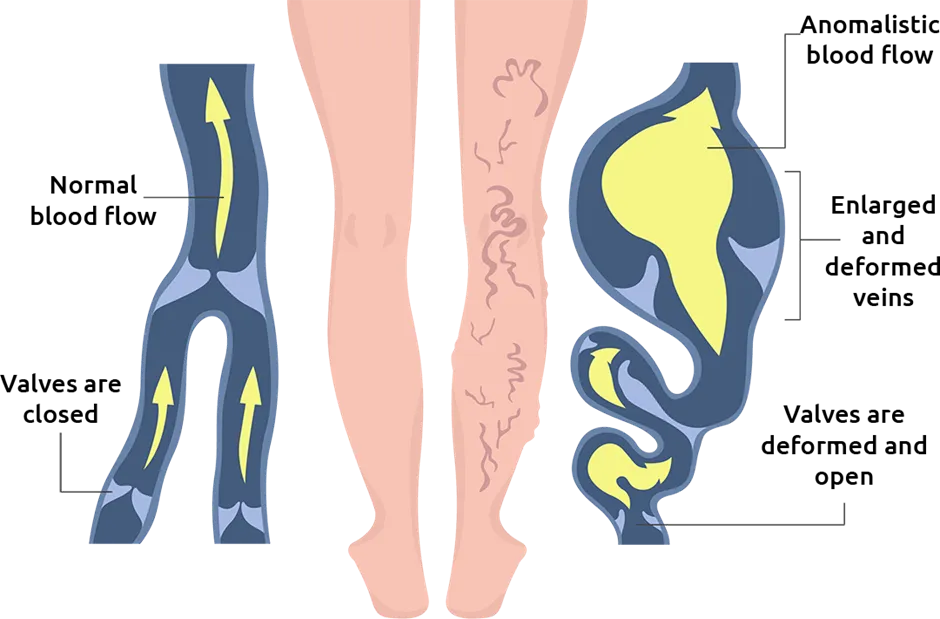



Approximately one-third of the population will experience varicose veins at some point in their lifetime. Naturally, many people are concerned about developing varicose veins, and it is even more obvious that many of those who have varicose veins worry about the consequences of these veins. Varicose veins are almost entirely hereditary. This means that individuals whose parents have varicose veins are also likely to develop them.
However, there are several ways to delay the onset of varicose veins, and these methods can also alleviate the discomfort associated with existing varicose veins.
If the varicose veins are perceived as very troublesome by the person who has them, there are also many effective methods available to operate on these varicose veins. Many of these operations can be performed at clinics outside of hospitals and are minimally invasive, allowing the patient to return home directly after a procedure that only takes about an hour to complete.
The varicose veins that may need to be operated on arise initially due to deficiencies in the valves in the veins in the legs. These deficiencies cause blood to flow back down into the veins and accumulate in pools that gradually increase in size in veins that then begin to meander superficially on the legs. The bluish color of these veins is due to the blood in them being oxygen-poor.

Over time, these varicose veins can grow to an extent where the person experiencing them finds them so bothersome that they want to operate on the varicose veins. When this situation arises depends on how the person perceives the discomfort caused by the varicose veins. There are several types of discomfort that varicose veins can cause, discomforts that over time can justify an operation of the varicose veins.
These discomforts can include varicose veins causing the legs to feel heavy and tired, mild pain, and difficult-to-heal, weeping sores on the lower part of the legs. Another issue that should not be underestimated is the cosmetic concern. Many people perceive varicose veins as very unattractive, which can lead to limitations in life such as a reluctance to wear skirts, short dresses, swimsuits, bikinis, swim trunks, or shorts.
Both the physical and psychological - cosmetic - discomforts that can come with varicose veins can be just as good reasons to operate on varicose veins. If an operation on the varicose veins leads to a reduction or disappearance of these problems and this, in turn, improves the life of the patient, then an operation of the varicose veins is obviously a very good solution.
Is there anything one can do for oneself if one is at risk of developing varicose veins due to, for example, heredity, or already has varicose veins and wants to avoid having the varicose veins reach the extent that they need to be operated on? In fact, there are several things a person can do themselves to prevent needing an operation for varicose veins.
These measures are primarily about improving blood circulation in the legs. Blood circulation is worsened by overweight, sedentary lifestyles, little physical activity, smoking, tight clothing over hips and thighs, and more, so by changing these factors, a person can delay the onset of varicose veins and also improve existing varicose veins in a way that makes an operation of the varicose veins avoidable or at least postponed.
When should one have the varicose veins operated on? This is not easy to answer. Whether and when to operate on one's varicose veins depends very much on personal preferences such as how one handles the discomfort created by the varicose veins, whether one has the ability to change their lifestyle so that the discomfort does not increase in scope, and how one perceives the cosmetic challenges that the varicose veins may pose.
The question of whether varicose veins should be operated on is also related to how extensive the body intervention is if one operates on the varicose veins. The cost of the operation of the varicose veins should also be considered. This cost includes both healthcare resources and the time the patient loses due to hospital stays and convalescence.
Nowadays, there are modern operations for varicose veins that significantly reduce costs both for the patient and healthcare. This has made the decision to operate on varicose veins easier to make. When it now involves a laser treatment that takes an hour to perform with local anesthesia at a clinic outside a hospital and the patient can return home directly after the procedure for a few days of convalescence, it is obviously not much of a barrier to operate on varicose veins. This makes it easier for more people to access treatments that can improve both their physical and psychological health.
This means that the threshold for when a treatment should be performed has become lower, and this makes the answer to the question of "when should I operate on my varicose veins?" that an operation of the varicose veins should be done when a person feels that the varicose veins cause discomfort or impose limitations in life, such as avoiding wearing shorts.
There are several well-established operations for varicose veins. The traditional method of surgery to remove varicose veins is not so common nowadays as it involves a relatively large intervention. The methods that are most common now are performed with a catheter that is inserted under the skin near the varicose veins. On the catheter, for example, a laser or glue is used to seal the veins with varicose veins. When these veins are sealed, they will soon shrink and then be removed from the skin. The procedure can be done with only local anesthesia and takes just an hour after which the patient can return home. Future operations for varicose veins will certainly become even less invasive and able to be performed even quicker at a lower cost.
As we conclude our article on "when do varicose veins need to be operated on", we can first and foremost state that it is up to the person with the varicose veins to decide when he or she wants to operate on their varicose veins. Since varicose veins are almost never dangerous, there is almost never pressure from the healthcare system to operate on the varicose veins.
But as the acceptance for cosmetic aspects has increased within the care sector and the threshold for what is considered normal suffering has decreased while the methods for operating on varicose veins have become more modern and less invasive, the decision about varicose vein surgery has become easier to make. It can thus be said that varicose veins should be operated on when a person who has them perceives them as a problem, whether the problem is physical, cosmetic, or both.
This article is based on research and publications from reputable sources to provide you with the most reliable information. Here are some of the main sources used:
By using these sources, you can be sure that the article is based on current and scientifically reviewed information.

Become varicose vein free: We offer full treatment at a fixed and transparent price regardless of the treatment method. With us, there are no hidden fees.
Learn more about our prices

